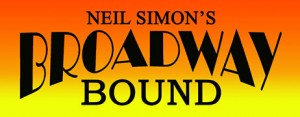 Neil Simon’s Broadway Bound is like a family holiday dinner at your aunt’s house; everyone is there, and you know you’ll be chided for your life decisions, patted on the back by an understanding distant relative, cry in the bathroom, find the humanity in one of your parents, be extremely annoyed with your sibling and walk out with leftovers. The play is currently being presented by the Little Theatre of Fall River at Bristol Community College with direction from Kathy Castro, who won the Motif award for best community theater direction in 2012, and assistant director Betty Teixeira, another Motif award recipient.
Neil Simon’s Broadway Bound is like a family holiday dinner at your aunt’s house; everyone is there, and you know you’ll be chided for your life decisions, patted on the back by an understanding distant relative, cry in the bathroom, find the humanity in one of your parents, be extremely annoyed with your sibling and walk out with leftovers. The play is currently being presented by the Little Theatre of Fall River at Bristol Community College with direction from Kathy Castro, who won the Motif award for best community theater direction in 2012, and assistant director Betty Teixeira, another Motif award recipient.
The piece appeared on Broadway in 1986 to much acclaim (it received four Tony nominations). The story is a semi-biographical piece that at its core is about a divorcing couple and their family. It is told through access to the internal monologue of Eugene, a young Jewish guy living in the New York “suburb” of Brighton Beach, as he observes his multi-generational household. Set in 1949, before the widespread adoption of home television sets, we’re instantly privy to Eugene’s dream of becoming part of a “genius radio comedy writing team” in New York City. His brother Stan is his partner, main motivator and collaborator, and the brother-team finds no lack of humorous inspiration within the walls of their own home.
Living within view of the skyscrapers of New York City in a single family house, we observe the interpretations of capitalism and opportunity that such sights inspire. With each having their own understanding of the American dream, we get to know parents Kate and Jack Jerome, housewife and ladies raincoat cutter respectively, his brother, and his maternal grandfather, Ben. This domestic domain serves as a backdrop for dives into the strata of the American story, including but not limited to Jewish persecution and immigration in the first quarter of the 20th century and the moral conflict of being a socialist in the capitalist hot bed of the world, the first generation experience of culture shock, social pluralism, cautious optimism and access to economic comfort and (even) wealth in the trajectories of Eugene’s parents’ generation, and the complete assimilation into American mainstream society exhibited through the pop interests of Eugene and Stan. These larger themes add nuance to a story about our most basic commonalities; the hypnotic and engrossing effects of romantic infatuation, the restrictive institution of marriage and how our time-space reality influences our ability and to express our need for affection, love and life purpose. Simon adds layer after layer of depth to a story that could be very simplistic, to great effect.
Michael Eckenreiter, who plays Eugene, does a great job enthusiastically interacting with the set and his fellow actors in a way that hints at mid-century culture, while Nishan Lawton (Stan) provides comedic relief in this play about comedy writing. The play snakes its way through tragedy and humor, at times in confusing ways that really do bring flashbacks of your own family gatherings. At one end is Stephen R. Kay’s hilarious and convincing depiction of a man of conviction going senile (funny), and on the other end is Erica Borges Vitelli, brilliantly holding down an unflinchingly smothering but loving Jewish mother role. With even a hint of comedy in her performance, Kate would seem so parodied it would border on offensive, but she balances the typical nagging, overbearing, overprotective generalization with a warmth and groundedness that make her the star of the play. A definite highlight is when Kate slides out of her domesticated psychological confines to show us a glimpse of the sexual, graceful and enchanting young girl she once was. Her husband, Jack, played by Matt Morin, comes in and out of the play and in many ways is its only villain (other than capitalism and the numbing effects of selfless devotion). He plays the cheating father role, but keeps our sympathy. The play is framed by a well-designed split level stage that fittingly enables montage-like scenes and views into multiple situations at once.
The experience is a roller coaster, but one that will ultimately let you off with a bit more appreciation for your parents, and maybe a deeper empathy for the small tragedies and the healing powers of family relationships. If you want to see a play layered with relativism that ultimately has a happy ending, then Broadway Bound is for you. It won’t disappoint.
Thanks for the great review Tracy~~~We've posted to our show page.